NO RELATIVE AGE EFFECT AMONG BRAZILIAN ELITE FEMALE FUTSAL ATHLETES: AN ANALYSIS BASED ON TACTICAL INDIVIDUAL PERFORMANCE AND TEAM’S FINAL POSITION IN THE NATIONAL CHAMPIONSHIP
Keywords:
Birth date, Youth sports, Sports performance, Futsal, FemaleAbstract
Our aim in this study was to analyze: (i) the presence of the relative age effect (RAE) on the Brazilian elite female futsal athletes according to their team’s final position in the National Championship, and (ii) the relationship between the presence of the RAE and the athletes’ tactical individual performance. Participants were 77 female Brazilian elite futsal athletes that competed in the 2021 National Championship. Data included their dates of birth aggrupation by quartiles (Q1-Q4), their team’s final position in the National Championship, and their tactical individual performance indicators (time played, goals scored, assists, steals, shots on goal, unbalanced passes, and challenges won in 1vs1). Analyses of the overall sample indicated that RAE was not prevalent in this context since the observed birthdate distribution was not different from the expected one (p=.796). When the final placement in the championship was considered, the birthdate distributions were also not different from the expected for both the top-ranked (p=.572) and low-ranked (p=.679) team athletes. Regarding athletes’ tactical individual performance, no differences were found between the athletes with early and late birthdates for any of the variables analysed (p>.05). Our results suggest that RAE has no impact on this specific sport context, which should be interpreted as a positive factor since female futsal athletes seem to have the same chance of achieving the elite level in Brazil, regardless of their birthdates.
Key words: birth date, player development, sports performance, futsal, female
Downloads
Published
How to Cite
Issue
Section
License

This work is licensed under a Creative Commons Attribution-NonCommercial 4.0 International License.
At Faculty of Kinesiology we recognize that access to quality research is vital to the scientific community and beyond. Kinesiology is non-profit journal and all costs of publishing and peer review process are covered by the publisher itself or other funding sources like Ministry of Science and Education of the Republic of Croatia. Full text papers are also available free of charge at http://hrcak.srce.hr/kineziologija. There are no restrictions on self archiving of any form of paper (preprint, postprint and publisher's version).
Articles are distributed under the terms of the CC BY - NC 4.0
Kinesiology does not charge any fees to authors to submit or publish articles in our journal.


